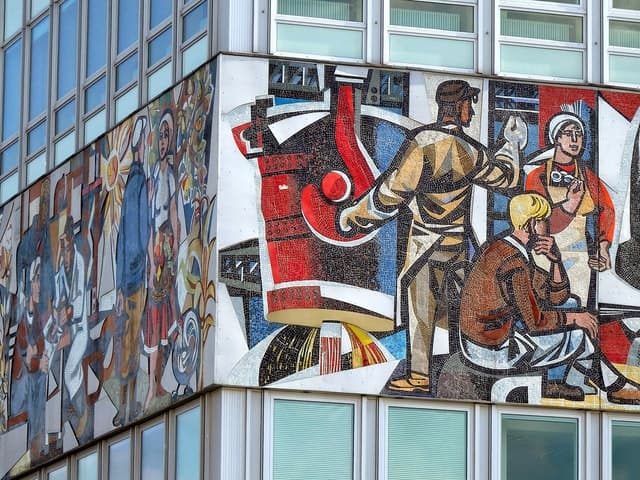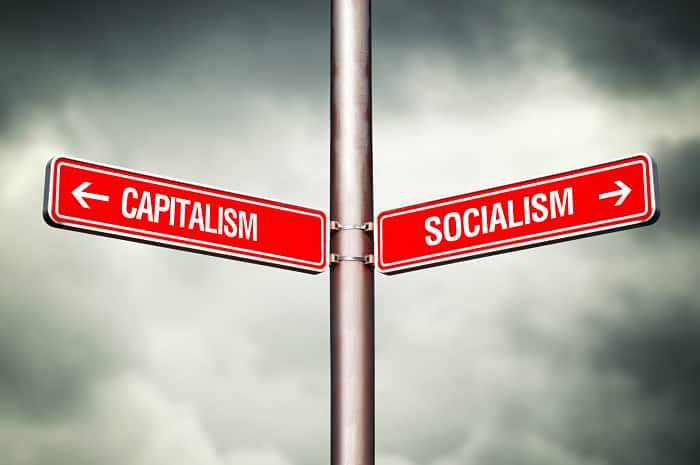
Socialism and capitalism seem to be at odds with each other. You’ll see the two ideas being debated in the news, on TV, in print, and online. Despite their differences, people from all ranges of political beliefs can have a conversation about socialism and capitalism. This is because everyone has a general idea of what each term means. Just think about it for a moment…
Contents
- 1 Capitalist vs. Socialist Economies: Pros & Cons
- 2 Capitalism
- 3 What is socialism, in simple terms?
- 4 Where did socialism come from?
- 5 How Does Socialism Work? The Main Principles
- 6 Types of Socialism
- 7 Socialism examples
- 8 Advantages and Disadvantages of Socialism (Key Differences)
- 8.1 Is Socialism Good? Key Pros
- 8.1.1 Social Justice
- 8.1.2 Production Based on Needs
- 8.1.3 Egalitarian Distribution of Riches and Financial Gain
- 8.1.4 Quick Economic improvement
- 8.1.5 Well-balanced Industrial Development
- 8.1.6 Economic Stability
- 8.1.7 Ecological Conservation
- 8.1.8 Minimal Exploitation and Class Struggles
- 8.1.9 Social Welfare
- 8.1.10 Resume
- 8.2 Why Is Socialism Bad? Key Cons
- 8.1 Is Socialism Good? Key Pros
- 9 Conclusion
Regardless of the resurgence in the popularity of socialist ideology, there’s too little understanding of what precisely socialism is and why it works. The expression has been abused and overused to the point where it’s almost lost its significance. Let us define socialism more precisely.

Capitalist vs. Socialist Economies: Pros & Cons
What is the difference between socialism and capitalism? Let’s compare these systems.
Capitalism and socialism are economic structures that nations use to control their financial resources and modulate their production methods.
In the US, we specify capitalism as an economic system where private people or companies, instead of the authorities, control and own the factors of production:
entrepreneurship,
fund products,
organic sources,
as well as labor.
Capitalism’s success depends on a free market driven by demand and supply.
With socialism, the government makes all lawful production and distribution choices, with folks determined by the state for meals, employment, health care, and whatever else. In the free market, the government determines the quantity of output or provides the pricing amounts of services and goods.
Communist nations, such as China, North Korea, and Cuba, are inclined toward socialism, while Western European countries prefer capitalist economies and attempt to create a middle class. But even in their insecurities, the two systems have their advantages and disadvantages.
Capitalism
Indications of greater need typically cause more excellent production. An ideal supply helps level charges out to where just the most vigorous opponents remain. Competitors attempt to maximize profit by promoting their merchandise as much as possible while keeping prices low. Additionally, part of capitalism would be the free performance of their capital markets. Supply and demand determine reasonable rates for stocks, derivatives, bonds, currencies, and commodities.
It’s a populist industrial and policymaking system of rules based on open control (AKA collective ownership) of the means of manufacture.
In socialist economies, significant financial decisions aren’t left to the markets or determined by self-interested people. Instead, the authorities — who own or control a lot of the economy’s assets — determine the what’s, when’s, and how’s of manufacture. We also see this strategy as “centralized planning.”
Examples of significant social demands include:
transport,
protection,
schooling,
health care,
and the preservation of natural resources.
Some additionally specify the common good as caring for people who cannot directly bring about production.
This system prompts them to work long hours if they wish to get more. Employees received their share of manufacturing after a percentage for frequent good was deducted.
Advocates of socialism assert that the shared possession of funds and social preparation affect an equal distribution of products and services and a more fair society.
Socialists suppose that the fundamental nature of individuals is concerted. They consider this crucial character has not yet emerged because capitalism or feudalism have compelled people to become more aggressive. Socialists argue that the financial system has to support this essential human characteristic.
Both communism and socialism relate to left-wing schools of industrial thought that oppose capitalism. But socialism is much more permissive than pure communism, making no allowances for personal property.

There were no rights for employees; a meager salary; too long hours; and no security provisions. As the elite group of capitalists grew more wealthy and more rewarded, the working class wallowed in poverty. The thought of socialism took root in the mid-19th century because of the growth of trade associations and the publications of the German theorist Karl Marx. Karl Marx used systematic investigation to reveal the consequences of capitalism and the exploitation and alienation that led to it. Based on Marx, employees were the origin of riches; through capitalism, this prosperity went into the hands of some rather than returning to the employees. Throughout his publications, he supported a revolution that could see the working class collectively own the means of production. After Marx’s writings, many countries began experimenting with many variations of socialism.
How Does Socialism Work? The Main Principles
Some fundamentals of socialism comprise:
Public Assets
The means of production and distribution are controlled, managed, and monitored by society in a socialist economy, either through the state or through associations.
The primary motive isn’t to utilize the means of production for profit, but for societal welfare.
Economic Planning
In contrast to a capitalist market, the laws of demand and supply don’t induce a socialist call. Instead, all financial activities—manufacturing, distribution, trade, and consumption—are coordinated and planned by a central planning authority, usually the government.
A socialist market counts on fundamental planning authority to disperse wealth, rather than relying on market forces.
Egalitarian Society
Early socialism appeared as a response to the financial inequality caused by premature capitalism. Therefore, it aims to have an egalitarian society in which there are no classes. Ideally, most of the people within a socialist market ought to have economic equality.
Provision of essential needs
In a socialist economy, the basic needs — food, shelter, clothes, schooling, health, and employment — are all supplied by the government with no discrimination. This is only one of the essential benefits of socialism.
However, the supply of basic needs from the authorities can induce the masses to believe they can’t survive without the controls, creating a perfect atmosphere for the growth of authoritarian governments.
No Competition
Typically, if you wish to buy a vehicle, you’re spoiled for choice. Precisely, the same applies to many goods.
In a socialist market, there’s no competition in the marketplace, since the country is the only real entrepreneur. The condition focuses on the supply of requirements, which leads to restricted customer choice.
Price Control
In socialist economies, the country regulates and controls the cost of merchandise.
The nations set the market price for consumer products and the accounting cost, which assists managers in making decisions concerning the creation of products.
Social Welfare
Another leading cause of the growth of socialism was that it was supposed to guard the working class from manipulation. Under socialist systems, there’s no exploitation.
Types of Socialism
There are nine forms of socialism. They disagree on how capitalism can best be flipped into socialism and highlight various elements of socialism. Working individuals handle the way production works, and there’s a democratically chosen government. Democratic preparation is used for regular products, including mass transit, housing, and energy, whereas the free market may create and distribute consumer products. Even though the revolution isn’t always a violent one, socialism will emerge just after capitalism has been overthrown. The aspects of manufacturing are owned by the employees and maintained by them through central planning. This is radical socialism, where the state occupies and administers all factors of production. After the criticisms of capitalism have been eliminated, people will seek a socialist society that manages free economic, political, or societal hierarchies. They’ll see if it’s best for their self-interest. The employees own the manufacturer. They determine how to disperse among themselves. They can sell surplus generation in the free marketplace. This sort of socialistic market is highly worth the upkeep of natural resources. Public ownership of big corporations accomplishes this. Manufacturing focuses on ensuring that everyone has enough fundamentals, rather than on consumer products that are unnecessary. This type of economy provides a livable wage for everybody. This refers to types of socialist ideology that derive from spiritual values. Many spiritual values in human culture have been tainted by socialist ideas. Spiritual teachings of brotherhood will be the same values given by socialism. This was a fantasy of equality compared to a concrete strategy. The idea appeared before massive industrialization and could have been carried out peacefully via a collection of experimental societies. This type advocates for democratic socialism through gradual reforms and other peaceful means rather than through revolution. Democratic Socialism
Revolutionary Socialism
Authoritarian Socialism
Libertarian Socialism
Economic Socialism
Green Socialism
Christian Socialism
Utopian Socialism
Fabian Socialism
Socialism examples
These days, it could be tough to point to only socialist nations. However, some governments are recognized as majorly socialist, even though they also comprise some minor types of capitalism or communism.

What is a socialist country? A few examples of such states comprise:
USSR
Before it failed in 1991, the USSR controlled all forms of production. The government owned the bunny along with the property.
Cuba
Cuba is another notable example of a socialist state. The government controls the market, all degrees of schooling, federal health education, homes, subsidized food applications, utilities, and even amusement. The nation doesn’t have a stock market, and it is a substantial indicator that the authorities aren’t capitalistic.
North Korea
North Korea is another powerful socialist nation. The country conducts its own market and many social programs. Like Cuba, North Korea doesn’t own a stock market.
China
We can’t term China purely socialist, even though it still has some elements of socialism. While the nation has abolished state-run health care, many areas in China are still socialist. Capitalism is only permitted in specific geographical territories called “Special Economic Zones.” Everyone who would like to have their own company in China must proceed to those special zones.
Other Nations
Nations such as Turkmenistan, Laos, Zambia, Belarus, Venezuela, Vietnam, and Syria can also be considered socialist since their authorities are firmly involved in health care, social programs, and the media.
Advantages and Disadvantages of Socialism (Key Differences)
In this report, we analyzed the positives and negatives of socialism.
Is Socialism Good? Key Pros
Socialism has some advantages that made it an attractive financial system when capitalism has been rife with injustices and manipulation. Some benefits of socialism comprise:
Social Justice
This is perhaps the most important pros of socialism. Socialism advocates the removal of economic inequalities and the fair and even distribution of federal income. Under socialism, everybody gets their fair share of the national wealth. All individuals are given equal chances, and it removes manipulation.
Production Based on Needs
Among the substantial drawbacks of capitalism is that production depends on the tiny elite’s buying power. Socialism prevents such situations.
Egalitarian Distribution of Riches and Financial Gain
Socialist markets are devoted to providing equal opportunities for everybody. There’s no exploitation. Property is distributed to employees according to their input into the market.
Quick Economic improvement
Under a socialist market, there’s a central authority responsible for preparing funds and making rapid decisions. Resources are utilized thoroughly, and there’s minimal wastage. This also contributes to the speedy economic development of socialist nations.
Well-balanced Industrial Development
With economic preparation fundamental to socialism, growth could be achieved in balance within the entire nation. Rather than focusing on particular locations, financial planning helps ensure all areas are developed, such as backward regions.
Economic Stability
Socialism also reduces the chance of financial instability. Under capitalism, markets often experience changes, resulting in wastage of funds and high levels of unemployment. This is highly improbable in a socialist market. Considering that the market is well-intended and there isn’t any private investment, economic changes are infrequent in socialist economies.
Ecological Conservation
Among the most significant issues with capitalistic economies is that there’s a superb discount for natural resources. Considering that a central authority controls the market, this ability could plan for the future and ensure that its natural resources are preserved and utilized economically.
Minimal Exploitation and Class Struggles
Among the chief goals of socialism is to create a classless society in which all members are equal. There is no wealthy class that can exploit the poor.There’s no discrimination here, and no favors are accorded to members of this society, since everybody is equal. This eradicates class conflicts, which are a substantial portion of capitalistic economies.
Social Welfare
The state caters to each of the fundamental needs of an individual. Imagine a scenario where the country provides your meals, a home, clothes, health care, education, and occupation. If you get into an accident while doing your responsibilities, the condition cares for and supplies your loved ones as you recuperate.
In this kind of economy, individuals may dedicate themselves to function without worrying about tomorrow, contributing to greater productivity. Compare this to capitalist societies, where a company may hire someone, but they do not receive enough to find a place to live or pay for health care if they become ill.
Resume
Under capitalism, because market systems are automatic, there are no guarantees that every individual’s basic needs will be fulfilled.
In socialist societies, fundamental needs are fulfilled; a socialist system’s primary advantage is that the people living under it are provided a social security net. In this concept, economic inequity is decreased, along with financial hardship. It supplies necessities. The government may create the merchandise people need to fulfill their wants, even when creating them doesn’t lead to a gain. Under socialism, there is more space for value conclusions without attention paid to calculations between profit and nothing but growth.
Socialism may also be more effective because there is less need to market products to customers who may not want them, resulting in less money spent on product marketing, marketing, and advertising campaigns.
Why Is Socialism Bad? Key Cons
Despite its many benefits, socialism isn’t all virtue. Socialism also has its disadvantages, finally causing the collapse of several socialistic economies. Some cons of socialism include:
There is No Acceptable Basis for Pricing.
In socialist markets, market forces aren’t at play.
Since the manufacturing instruments are owned by the state, which also increases as the sole entrepreneur, it doesn’t have a market estimate. This produces a scenario where there isn’t any sufficient basis for calculating the manufacturing costs for products and services.
Incentives are insufficient.
Socialism prioritizes collective health over private gain or self-interest.Because socialism is contrary to the accumulation of riches for yourself, it gets to a place where the extra effort doesn’t lead to any revenue on its own.
Without earnings motivation, employees lack the stimulus to work hard and be innovative. This finally results in low productivity and reduces the speed of financial improvement.
Economic Freedom Deficiency
Socialism takes away people’s liberty to venture through societal possession, which gives people a free choice of job. Unlike in capitalistic markets, where you’re free to pick your career, employees are assigned jobs by the planning authority in a socialistic market. The employees can’t alter their tasks without the permission of the planning authority.
Deficiency of Consumer Freedom
Capitalistic markets provide customers with a choice. Do you not enjoy Coca-Cola? You can drink Pepsi. Under a socialist call, you’ve got a minimal option. The planning authority decides the goods that will be produced and the costs for these goods. If you don’t enjoy a product or its worth, there’s very little you can do. It is a take-it-or-leave-it circumstance.
Resume
Socialism seems more joyful, but it has its shortcomings. One drawback is that individuals have minors to get and feel less attached to the fruit of their efforts. Because of this, the engines of economic growth are poorer.
Another strike against socialism is that state planners are not foolproof or incorruptible. In specific socialist markets, there are shortfalls in the most crucial goods. Since there’s no free market to facilitate alterations, the system might not control itself as fast or as well.
In capitalist economies, individuals have powerful incentives to work hard, boost efficiency, and create superior products. By rewarding creativity and invention, the market maximizes economic growth and personal prosperity when supplying a variety of products for customers. By supporting the creation of desired outcomes and discouraging unnecessary or unwanted ones, the market self-regulates, leaving room for government interference and mismanagement.
Conclusion
Is socialism good or bad? Like most other political and economic philosophies, socialism has its advantages and pitfalls. Though there are many benefits linked to the political notion, there are also many problems with socialism. A strictly socialist regime won’t be sustainable in the long term, so we ought to combine socialist values with free-market forces. By applying this policy combination, we can guarantee social safety on the one hand while also giving sufficient financial liberty to businesses.


